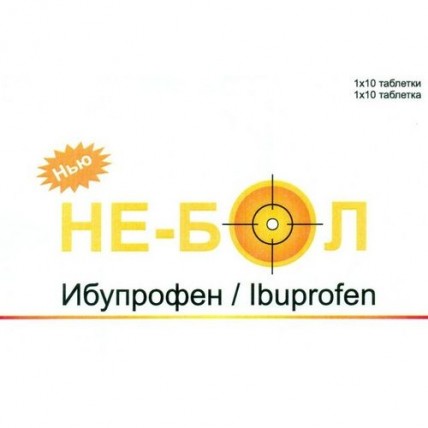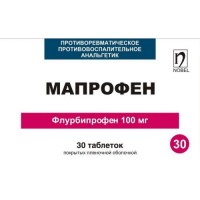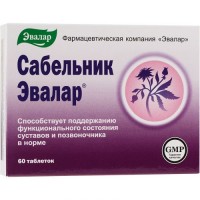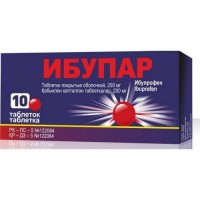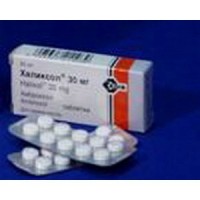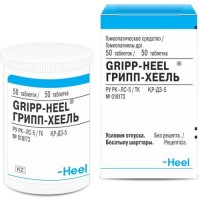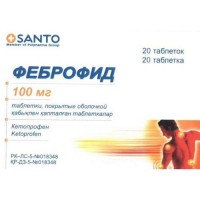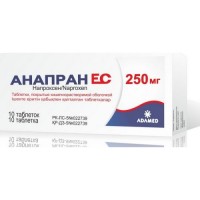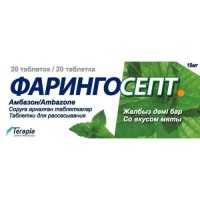New non-Bol 10s 400 mg film-coated tablets
- $4.00
The instruction for medical use of New Ne-Bol Torgovoye medicine a name New Ne-Bol the International unlicensed name Ibuprofen Dosage Form of the Tablet, film coated, 400 mg Structure One tablet contains active agent: ibuprofen of 400 mg, excipients: silicon colloidal anhydrous (aerosil), starch corn, sodium lauryl sulfate, sodium of starch is glikolit, the talc purified magnesium stearate, K 30 povidone, structure of a cover: White SC-SP 3180 (Spraycel) dye. The description of the Tablet, film coated white color, a capsulovidny form, biconvex, with risky on the one hand. Pharmacotherapeutic group Anti-inflammatory and antirheumatic diseases. Non-steroidal anti-inflammatory drugs. Propionic acid derivatives. The ibuprofen ATX M01AE01 Code the Pharmacological Pharmacokinetics Ibuprofen properties quickly and almost is completely soaked up from digestive tract. Peak values of concentration in blood plasma are reached approximately in 1-2 hours after reception. The ibuprofen for 99% contacts proteins of plasma and has elimination half-life 1-2 hours. It is intensively metabolized in a liver and quickly removed with urine (80%), mainly, in the form of metabolites and their conjugates. The ibuprofen in insignificant quantity is allocated in breast milk. The pharmacodynamics the Ibuprofen renders anti-inflammatory, analgeziruyushchy and febrifugal effect. Shows the action by cyclooxygenase enzyme suppression that causes considerable decrease in level of prostaglandins playing a significant role in pathogenesis of inflammation, pain and fever. Analgeziruyushchy action is caused by two mechanisms: peripheral (through suppression of synthesis of prostaglandins) and central (through suppression of synthesis of prostaglandins in the central and peripheral nervous system). Suppresses aggregation of thrombocytes. New Ne-Bol – drug the containing ibuprofen, has anti-inflammatory, analgeziruyushchy and febrifugal effect. Indications - a headache, migraine - myalgias, neuralgia - lyumbalgiya, sciatica - joint pains in a pseudorheumatism, an osteoarthrosis, an ankylosing spondylitis - a toothache, pain after odontectomy - posttraumatic pains, including sports (stretchings, bruises, dislocations) - a bursitis, a tendinitis - a feverish syndrome in flu, catarrhal and other infectious and inflammatory diseases the Route of administration and doses for the purpose of minimization of risks of development of undesirable reactions, an ibuprofen it is necessary to accept in a minimal effective dose and throughout minimum short period necessary for achievement of clinical effect. The drug is taken inside at meal time for reduction of risk of development of dispeptic effects, washing down with a glass of water (200 ml). To adults and children 12 years are more senior: on 1 tablet (400 mg) 2-3 times a day. The maximum daily dose – 3 tablets (1200 mg). Treatment duration – no more than 7 days. At more long-term treatment the consultation of the doctor is necessary. At patients with a renal failure, a liver or heart the dose of drug needs to be reduced. Side effect Is frequent - a headache, dizziness, insomnia, uneasiness, nervousness and irritability, psychomotor excitement, drowsiness or fatigue - a gastropathy (nausea, vomiting, an abdominal pain, heartburn, a loss of appetite, diarrhea, a constipation, a meteorism, pain and discomfort in epigastric area), erosive cankers of a mucous membrane of digestive tract (in some cases are complicated by perforation and bleedings), irritation, dryness of a mucous membrane of an oral cavity or mouth pain, an ulceration of a mucous membrane of gums, aphthous stomatitis, pancreatitis, hepatitis, increase in activity of hepatic transaminases Sometimes - bleedings (gastrointestinal, gingival, uterine, hemorrhoidal) - skin rash (usually erythematic, a small tortoiseshell), a skin itching and also asthma attacks (sometimes with falling of arterial blood pressure) - hypostases, especially at patients with an arterial hypertension or a renal failure Very seldom - decrease in hearing, a ring or sonitus, a reversible toxic optic neuritis, illegibility of visual perception or a diplopia, dryness and irritation of eyes, a chemosis and a century (allergic genesis), scotoma, a disorder of vision (disturbances of color sight, scotoma, an amblyopia) - aseptic meningitis (is more often at patients with autoimmune diseases) - stiff neck, consciousness turbidity, a depression - development or aggravation of heart failure, tachycardia, increase in arterial blood pressure - anemia (including hemolytic, aplastic), thrombocytopenia and a Werlhof's disease, an agranulocytosis, a leukopenia, increase in a bleeding time - an esophagitis, pancreatitis - an abnormal liver function - an acute renal failure, allergic nephrite, a nephrotic syndrome (hypostases), a polyuria, cystitis, increase in concentration of uric acid - a Quincke's disease, anaphylactoid reactions, an acute anaphylaxis, a bronchospasm, fever, a multiformny exudative erythema (including. Stephens-Johnson's syndrome), a toxic epidermal necrolysis (Lyell's disease), an eosinophilia, allergic rhinitis - skin infections (nekrotiziruyushchiysya a fascitis) Contraindications - hypersensitivity to an ibuprofen or any of the components which are a part of drug - existence in the anamnesis of reactions of hypersensitivity (bronchial asthma, a bronchospasm, rhinitis, rinosinusit, recurrent polyposes of a nose or near-nasal bosoms, a Quincke's edema, urticaria) connected with use of acetylsalicylic acid (salicylates) or other NPVP - the profound dehydration (as a result of vomiting, diarrhea or insufficient consumption of liquid) - erosive and ulcer diseases of bodies of digestive tract (including a peptic ulcer of a stomach and duodenum in aggravation stages, Crohn's disease, ulcer colitis, a round ulcer) or ulcer bleeding in an active phase or in the anamnesis (two or more confirmed episode of a peptic ulcer or ulcer bleeding) - the bleeding or perforation of an ulcer of digestive tract in the anamnesis provoked by use of NPVP - inflammatory bowel diseases - a heavy liver failure or a disease of a liver in an active phase - a heavy renal failure (clearance of creatinine & lt, 30 ml/min.), the confirmed hyperpotassemia - the progressing diseases of kidneys - a heavy course of arterial hypertension - heavy heart failure (NYHA IV), the period after performing aortocoronary shunting - hemophilia and other disturbances of blood clotting (including hypocoagulation), hemorrhagic diathesis - diseases of an optic nerve, disturbance of color sight, an amblyopia, scotoma - decrease in hearing, pathology of a vestibular mechanism - intolerance of fructose (deficit glyukozo-6-fosfatdegidrogenazy) - intracraneal hemorrhages - pregnancy and the period of a lactation - children's age up to 12 years Relative contraindications: - advanced age - a peptic ulcer of a stomach and duodenum (in the anamnesis), gastritis, enteritis, colitis - a disease of blood of not clear etiology (leukopenia and anemia) Medicinal interactions Inductors of microsomal oxidation (Phenytoinum, ethanol, barbiturates, rifampicin, phenylbutazone, tricyclic antidepressants) increase products of hydroxylated active metabolites, increasing risk of development of heavy hepatotoxic reactions. Inhibitors of microsomal oxidation reduce risk of hepatotoxic action. New Ne-Bol reduces effect of hypotensive medicines (including blockers of slow calcium channels and inhibitors of angiotensin-converting enzyme), natriuretic and diuretic activity of furosemide and a hydrochlorothiazide. New Ne-Bol reduces efficiency of uricosuric medicines, strengthens effect of indirect anticoagulants, antiagregant, fibrinolitik (increase in risk of emergence of hemorrhagic complications). New Ne-Bol has ulcerogenic effect with bleedings at simultaneous use with glucocorticosteroids, colchicine, estrogen, ethanol. New Ne-Bol enhances effect of oral hypoglycemic medicines and insulin. Antacids and Colestyraminum reduce absorption of an ibuprofen. New Ne-Bol increases concentration in blood of digoxin, drugs of lithium and a methotrexate. Caffeine enhances analgeziruyushchy effect of the drug New Ne-Bol. At simultaneous use New Ne-Bol reduces anti-inflammatory and antiagregantny effect of acetylsalicylic acid (increase in frequency of development of acute coronary insufficiency in the patients receiving small doses of acetylsalicylic acid as antiagregantny means after the beginning of reception of an ibuprofen is possible). At simultaneous use with anticoagulating and thrombolytic medicines (alteplazy, streptokinase, an urokinase) New Ne-Bol raises risk of developing bleedings. Tsefamandol, tsefoperazon, tsefotetan, valproic acid, plikamitsin increase the frequency of development of a prothrombinopenia. Miyelotoksichny medicines strengthen manifestations of a gematotoksichnost of drug. Cyclosporine and drugs of gold strengthen influence of an ibuprofen on synthesis of prostaglandin in kidneys that is shown by increase in nephrotoxicity. New Ne-Bol increases plasma concentration of cyclosporine and a likelihood of development of its gepatotoksichny effects. The medicines blocking canalicular secretion reduce removal and increase plasma concentration of an ibuprofen. Special instructions Results of clinical trials assume presence of possible interrelation between reception of an ibuprofen, especially in high doses (≥ 2400 mg a day), with the small increased risk of development of the arterial trombotichesky phenomena, (for example a myocardial infarction and a stroke). Epidemiological researches do not assume interrelation between reception of low doses of an ibuprofen (≤1200 mg/days) and the increased risk of development of the arterial trombotichesky phenomena. To patients with uncontrollable arterial hypertension, stagnant heart failure on classification of NYHA II-III of a class established by coronary heart disease, diseases of peripheral arteries and/or cerebrovascular diseases it is necessary to appoint an ibuprofen only after careful assessment of a ratio advantage risk, at the same time it is necessary to avoid use of high doses of an ibuprofen (2400 mg/days). Prior to long therapy by an ibuprofen, especially high doses (≥ 2400 mg a day), at patients with risk factors of development of cardiovascular complications (for example, hypertensions, lipidemias, diabetes, smoking), it is necessary to carry out the careful assessment of a ratio advantage risk. In order to avoid development of erosive cankers of digestive tract, drug should be accepted at meal time. The interval between receptions has to make not less than 4 hours. At emergence of symptoms of a gastropathy the careful control including carrying out an ezofagogastroduodenoskopiya, blood test with definition of hemoglobin, a hematocrit, the analysis a calla on the occult blood is shown. For prevention of development of the NPVP-gastropathy it is recommended to combine with prostaglandin E drugs (mizoprostol). In need of definition of 17 ketosteroids, drug should be cancelled in 48 hours prior to a research. During treatment the intake of ethanol is not recommended. For reduction of risk of development of the undesirable phenomena from a GIT it is necessary to use a minimal effective dose minimum possible short course. With care Cirrhosis with portal hypertensia, a hyperbilirubinemia, a peptic ulcer of a stomach and a 12-perstny gut (in the anamnesis), gastritis, enteritis, colitis, a liver and/or renal failure (clearance of creatinine of 30-60 ml/min.), a nephrotic syndrome, chronic heart failure, arterial hypertension, coronary heart disease, cerebrovascular diseases, dislipidemiya / a lipidemia, diabetes, diseases of peripheral arteries, smoking, presence of an infection of Helicobacter pylori, long use NPVP, alcoholism, heavy somatopathies, a concomitant use of oral glucocorticosteroids (century of t. h Prednisolonum), anticoagulants (century of t. h warfarin), antiagregant (century of t. h klopidogrelya), selection itngibitr of the return serotonin reuptake (century of t. h a tsitalopram, fluoxetine, a paroksetin, sertraline), diseases of blood of not clear etiology (leukopenia and anemia) of Feature of influence of medicine on ability to run transport and other potentially dangerous mechanisms At use of drug can arise by-effects from the central nervous system, such as fatigue or dizziness that can affect ability to driving of the car and control of moving mechanisms. It is necessary to abstain from all types of activity requiring special attention, fast mental and motor reaction. Overdose Symptoms: nausea, vomiting, pains in anticardium, a headache. Sometimes there are a drowsiness and an ataxy. Arterial hypotonia, acidosis, renal failure or a liver and gastrointestinal bleeding, bradycardia, tachycardia, fibrillation of auricles is seldom noted, the apnoea is possible. Treatment: at an early stage of overdose the gastric lavage, intake of activated carbon is shown. If necessary hold the supporting events and symptomatic treatment. A release form On 10 tablets place in blister strip packaging from a film of the polyvinylchloride and printing aluminum foil varnished. On 1 planimetric packing together with the instruction for medical use in the state and Russian languages place in a pack from cardboard. To Store storage conditions in the place protected from light at a temperature not higher than 30 wasps. To store out of children's reach! 3 years not to apply a period of storage after an expiration date. Prescription status According to the prescription Lincoln Pharmaceutical Ltd Producer, India the Owner of the registration certificate of Inter Pharma, India 902, Vikram Tower, 16, Rajendra Palas, New Delhi – 110008 Ph. +91-11-25869290, +91-11-41538481 E-mail. interpharma@hotmail.com the Address of the organization accepting in the territory of the Republic of Kazakhstan claims from consumers on quality of products (goods) of KazEvroFarm LLP Almaty, Kurmangaza St. 48 and, office 9 the 050000 Phone number Index (727) 2729871, 2615141 Fax number (727) 2614466 E-mail:
To Develop Info@kazeuropharm.com
To Develop Info@kazeuropharm.com
